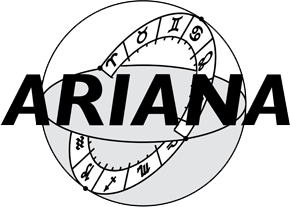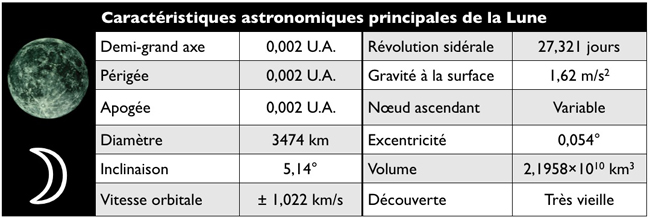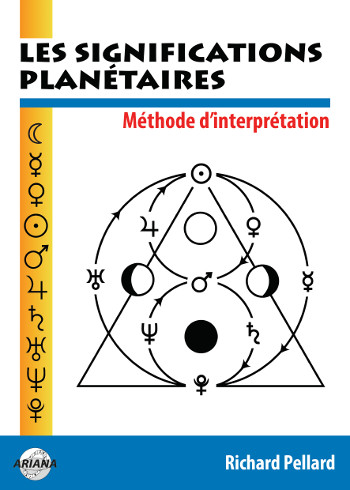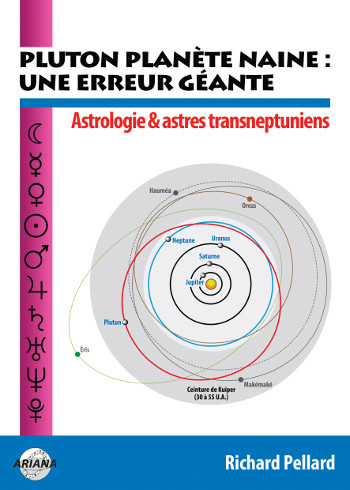Your Planets
Portraits of the Planets
Aspects between Planets
The planetary ages
The planetary families
Planets in Signs
The Planets in comics


The interpretation examples that we are suggesting are very far from being exhaustive: they only show and outline a general frame describing the issues of the planetary function. They should therefore not be taken literally. Each being brings indeed its own responses, more or less original, to the questions raised by a planetary function. There is no magic formula. Through using the R.E.T. and of the Theory of Ages and combining logic, observation and imagination, you will be able to develop a thousand other possible meanings, a thousand other variations on the same theme.
The Moon occupies a special position. Earth’s single satellite, promoted “twin sister” of our planet by certain astronomers, it receives, concentrates and synthesizes without differentiating them, all the global interactions of the solar system, in the same way as the Earth. Hence its function of globality.
Generally: maintaining wholeness. intensive power Everything that is global, coherent, homogeneous: the universe taken as a whole, an undifferentiated and inseparable reality. The inter-functional solidarity of the elements of a set closed on itself to preserve and protect the homogeneity of its constituent parts. The interdependence of the multiple elements of which known reality is made, knowable or unknown, real or imaginary. The real as a closed totality, rich in potentials and virtualities. The bonds of belonging that naturally unite beings, things or situations in “families”.
Psychologically: To be in a state of confident surrender, of serene plenitude, of tranquil quietude, of global receptivity. Maintain sound homogeneity (body-soul-spirit globality) by the plasticity of the spirit assimilating all possibilities without prejudice, the permeability of the soul which lives in osmosis with the visible and invisible realities, the regularity of the organic functions (food, sleep) which keep the body balanced. Belonging intimately to a familiar group of which one feels naturally united, an integrated and integral part. Build close ties of interdependence with the surrounding environment. Look for fluidity, harmony, lines of least resistance.
The lunar function is in itself a family of the R.E.T.: that of intensive power, opposite-complementary therefore dialectical of the trio of Extensive power of Sun-Mars-Pluto.
His qualities: Plastic, receptive, accommodating, welcoming, the lunar knows how to create around him a climate of peaceful daily life, warm intimacy, simple harmony, good-natured conviviality, and flourishes in buoyant, friendly and familiar atmospheres. Compliant, obliging, considerate, understanding, tolerant, supportive, he adapts flexibly to others. Faced with practical situations and the concrete problems with which he is confronted, he strives to find the lines of least resistance and to ensure solid support rather than exhausting himself in struggles. He marries as well as possible what the circumstances offer him in order to take advantage of it by adapting to it flexibly, day by day.
Subtle, dreamy, changing, undulating, imaginative, his inner life is rich. The need for plenitude, completeness, serenity, to live according to his intimate and personal rhythms are for him imperative requirements: he lives his dreams and dreams his life, in deep and relaxed osmosis with himself and his surrounding environment, in which he swims like a fish in water. He only makes those decisions that do not cost him, with which he is intimately one, those that circumstances impose on him and that preserve as much as possible the fade-out and the tranquility of a daily life that he wants devoid of any authoritarian tension. He assimilates without effort and without concentration knowledge and skills. His quest for well-being goes through the refusal of any restrictive discipline, and he knows how to make the demands of his self disappear in order to maintain the harmony of his group. His rich affectivity is marked by the need for osmosis, for fusion, for shared intimacy with those he loves, quite simply because with them he feels good, because he feels them and understands them intimately by putting himself effortlessly in their place.
While being friendly, loneliness does not scare him: in the moments when he puts himself away from the outside world and from others without being distant, he recharges his batteries in daydreaming, peaceful and fluid contemplation. Virgin of all a priori, of all certainty, he knows how to look at people and things with a fresh and fresh look. In sum, the “good for everything” Lunar is hyper-adaptable to all circumstances of life. Without forcing himself, without constraining himself, without even exercising his will, he knows so well how to marry the contours of things, to model himself on situations, to be granted the support and the confidence of beings that nothing seems to be able to resist him.
the lunar “negative” has the defects of its qualities. Each planetary function of the R.E.T. defines itself both by what it is and by what it is not. Take the example of the Sun, whose positive formula is “representation of Representation” (‘rR’). Its negative formula is therefore “no-eE-tT” : a pure solar (which does not exist, given that each individual has several planetary dominants) is deaf to information coming from the levels-goals or sources Existence and Transcendence. The problems of the lunar, they come from its difficulty in differentiating, distinguishing, serializing the information ‘R’, ‘E’ and ‘T’.
In negative, in spite of his benevolence, his good nature, the lunar is a fake sociable. The others interest him only insofar as their familiar presence does not disturb him, where he knows that he can count on them. They inspire him with no curiosity, no deep interest, no real desire. Too comfortable in his egocentric bubble, in his indolent subjectivity, entangled in his daily routines, nothing surprises him, captivates him, seduces him from the start. The others are for him only an undifferentiated magma to which he must adapt without enthusiasm to enjoy a gloomy but peaceful peace. He lives such a relationship of osmosis with others that he feels exempted from communicating.
In positive, the Lunar preserves his tranquility and plenitude by avoiding getting too involved in social exchanges. Rather than showing himself in his most attractive finery but to his fabricated and too artificial eyes, he prefers to maintain a state of natural availability which allows him to receive others rather than to interest them.
In negative, the lunar abhors struggles, conflicts and fights that concrete situations force us to carry out. The triviality of raw facts revolts him: it is an insult to his dreams of blissful harmony, of purring tranquility, of contented plenitude. He is reluctant to take life head on, to act directly on beings, things and situations for fear of losing his soft and indolent tranquility: he hopes that things will work themselves out. His experiences teach him nothing: he considers them globally as bad times to pass, which do not concern him in any way. Passive, subject to circumstances, he is incapable of realism and practical pragmatism.
In positive, the lunar, knows that to maintain his plenitude and his tranquility, he must more or less shelter himself from the vicissitudes of existence which only ask to disturb him. To do this, he can do the minimum (“work is health, doing nothing is to preserve it”) or the maximum (ensure his concrete means of existence without going to too much trouble).
In negative, the lunar is certainly a follower of reverie, but certainly not an inspired thinker and even less a visionary. Nothing original arises from his daydreams, which are only the faithful reflection of his banal preoccupations, and of his intimate, daily moods and without real relief. No imperious and insidious force in him incites him to affirm the specificity of his individuality: he is indifferent to being anonymous, drowned in the mass. The appearances of the unknown and the unpredictable coming from outside disturb and worry him, and he repulses those who come from within: he does not want them to force him to question his cozy routines.
In positive, the lunar possesses to the highest degree the art of making the extraordinary banal. With a healthy and confusing naturalness, he stays away from all delirium, without that preventing him from being whimsical at times. His deep ego has no crucial demands, no disturbing aspirations and no message to convey: it does not exist.
In negative, the lunar deeply lacks authority, relentless will, clear objectives, ambition, determination. Indecisive, indolent, weak-willed, too docile or too obedient, tossed about by circumstances, dependent on beings, things, situations, he does not want and cannot impose himself, assert himself, decide, choose. A soft and unconscious anarchism forbids him any discipline, any real adhesion to a collective rule. Changing, capricious, inconstant, versatile, too manageable, he refuses constraints, firm and precise commitments, responsibilities. No firm principle, no decisive conviction, no declared ideal seems to direct it.
In positive, the lunar knows how to preserve his sacrosanct intimacy against any intrusion of social characters that he may be led to play out of obligation. He has no desire to set himself up as an example, nor to mutilate himself by forcing himself to make demanding decisions when it is so much easier and healthier to let go…
In negative, the affects, perceptions and feelings that reach him disturb the lunar: they disturb his blissful tranquility. To be touched, moved, sensitized, it is to lose his peace of mind: he cannot stand it. The quivering, desiring and active presence of the other can become a real nuisance for him: he would like so much that what and those around him, who are part of his familiar universe, blend into the decor, stop manifesting their presence. and ask him to react. He seeks fusion, undifferentiated osmosis, and not the affective or sentimental exchange that requires two. For him, to have peace is to feel nothing, to be unaffected by any emotional turbulence.
In positive, the lunar knows how to maintain his tranquility away from any emotional disturbance, while remaining warm and receptive to others. He empathizes, communicates and understands intimately without allowing himself to be disturbed or overwhelmed by the emotional or sentimental passions generally implied by an excess of affectivity and sensoriality.
In negative, the lunar, completely monopolized by his routines, his day-to-day experience, has neither hindsight nor distance vis-à-vis his present situation. Naive, suggestible, easily influenced, impressionable, he sees no malice anywhere. He is not suspicious, has neither a penetrating mind nor the reflexes of investigation: incapable of discrimination, too receptive and too good a doughter, he “gobble” All. Credulous, childish, sheepish, fickle, he doesn’t ask himself questions or question anything: he accepts everything without taking the field, without doubt or skepticism. Exaggeratedly confident and overflowing with kindness, he is incapable of maneuvering skill, strategic subtlety, or effective trickery.
In positive, the lunar protects himself from all skepticism, all experimental mistrust and all chronic disillusionment by keeping a fresh, new and spontaneously confident look at the world around him and the beings who inhabit it. Spontaneous, natural and fundamentally kind, he is incapable of duplicity, trickery, dark machinations.
The reverse planetary function is the marsian function

▶ The lunar function (homogeneous wholeness)
▶ The Lunar: Psychological profile
▶ La dialectique des pouvoirs dans le système R.E.T.
▶ Pouvoirs de Soleil-Lune : la Lune
▶ Moon: intensive power
▶ Lunar stage (from 0 to 1 month old): the age of communion
▶ Espace personnel et aura lunaire
▶ Fonction lunaire et libéralisme économique

Les significations planétaires
par
620 pages. Illustrations en couleur.
La décision de ne traiter dans ce livre que des significations planétaires ne repose pas sur une sous-estimation du rôle des Signes du zodiaque et des Maisons. Le traditionnel trio Planètes-Zodiaque-Maisons est en effet l’expression d’une structure qui classe ces trois plans selon leur ordre de préséance et dans ce triptyque hiérarchisé, les Planètes occupent le premier rang.
La première partie de ce livre rassemble donc, sous une forme abondamment illustrée de schémas pédagogiques et tableaux explicatifs, une édition originale revue, augmentée et actualisée des textes consacrés aux significations planétaires telles qu’elles ont été définies par l’astrologie conditionaliste et une présentation détaillée des méthodes de hiérarchisation planétaire et d’interprétation accompagnées de nombreux exemples concrets illustrés par des Thèmes de célébrités.
La deuxième partie est consacrée, d’une part à une présentation critique des fondements traditionnels des significations planétaires, d’autre part à une présentation des rapports entre signaux et symboles, astrologie et psychologie. Enfin, la troisième partie présente brièvement les racines astrométriques des significations planétaires… et propose une voie de sortie de l’astrologie pour accéder à une plus vaste dimension noologique et spirituelle qui la prolonge et la contient.
Téléchargez-le dès maintenant dans notre boutique

Pluton planète naine : une erreur géante
par
117 pages. Illustrations en couleur.
Pluton ne fait plus partie des planètes majeures de notre système solaire : telle est la décision prise par une infime minorité d’astronomes lors de l’Assemblée Générale de l’Union Astronomique Internationale qui s’est tenue à Prague en août 2006. Elle est reléguée au rang de “planète naine”, au même titre que les nombreux astres découverts au-delà de son orbite.
Ce livre récapitule et analyse en détail le pourquoi et le comment de cette incroyable et irrationnelle décision contestée par de très nombreux astronomes de premier plan. Quelles sont les effets de cette “nanification” de Pluton sur son statut astrologique ? Faut-il remettre en question son influence et ses significations astro-psychologiques qui semblaient avérées depuis sa découverte en 1930 ? Les “plutoniens” ont-ils cessé d’exister depuis cette décision charlatanesque ? Ce livre pose également le problème des astres transplutoniens nouvellement découverts. Quel statut astrologique et quelles influences et significations précises leur accorder ?
Enfin, cet ouvrage propose une vision unitaire du système solaire qui démontre, chiffes et arguments rationnels à l’appui, que Pluton en est toujours un élément essentiel, ce qui est loin d’être le cas pour les autres astres au-delà de son orbite. Après avoir lu ce livre, vous saurez quoi répondre à ceux qui pensent avoir trouvé, avec l’exclusion de Pluton du cortège planétaire traditionnel, un nouvel argument contre l’astrologie !
Téléchargez-le dès maintenant dans notre boutique